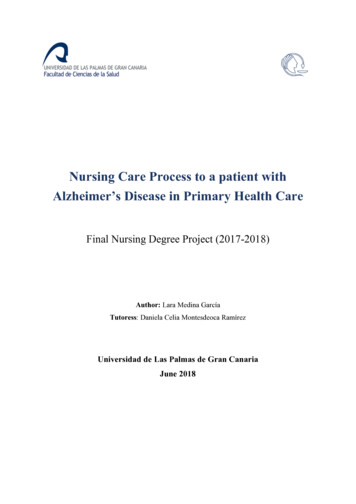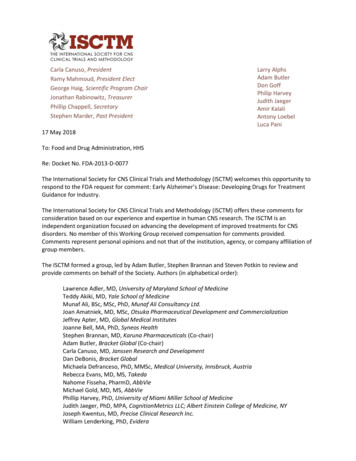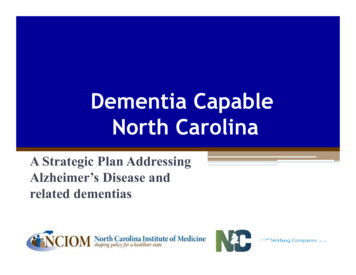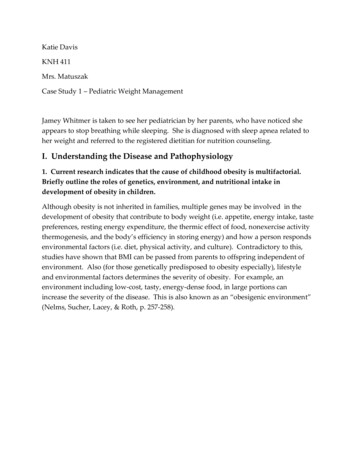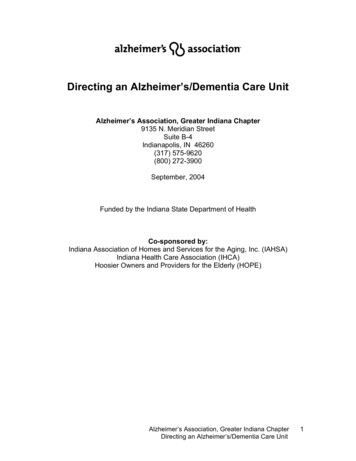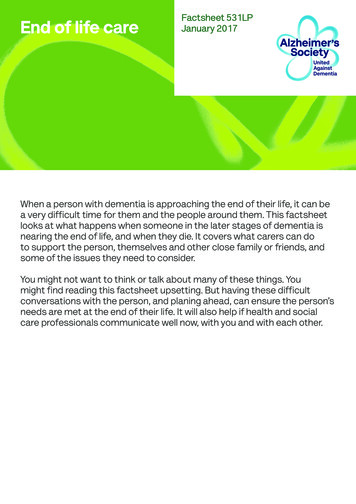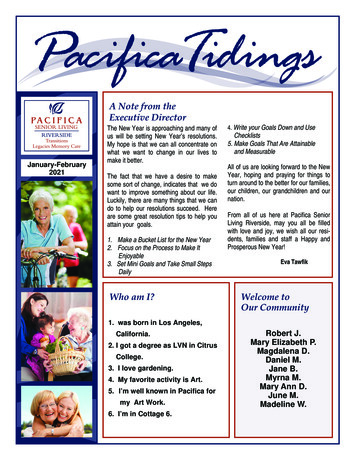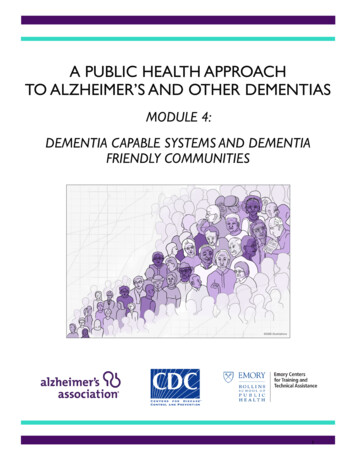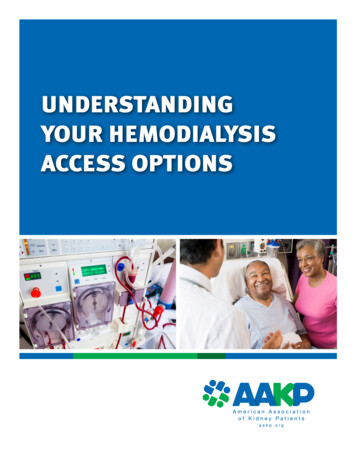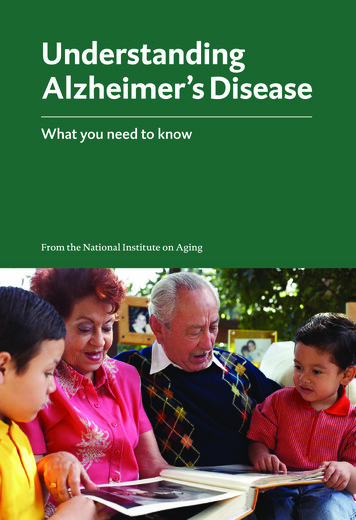
Transcription
UnderstandingAlzheimer’s DiseaseWhat you need to knowFrom the National Institute on Aging
For copies of this booklet, contact:Alzheimer’s and related Dementias Educationand Referral s.gov
Table of ContentsIntroduction1What is Alzheimer’s disease?3What are the signs of Alzheimer’s disease?4When should you see your doctor?7What are other causes of memory problems?9Are there treatments for Alzheimer’s disease?11What about research on Alzheimer’s disease?13Is there help for caregivers?15Summary—What you need to know16Where can you get more information?17Words to know19
Many older adults and their families are faced with Alzheimer’s disease.It’s important to know the signs of the disease and where to get help.
IntroductionMany older people forget someone’s name or misplace thingsfrom time to time. This kind of forgetfulness is normal. But,forgetting how to get home, getting confused in places a personknows well, or asking questions over and over can be signs ofa more serious problem. The person may have Alzheimer’sdisease (pronounced Allz-high-merz duh-zeez). It is a diseaseof the brain that begins slowly and gets worse over time.This booklet will help you learnabout Alzheimer’s disease: what it is signs of the disease when it is important to see your doctor treatment research studies how to get help caring for a person with Alzheimer’sTips about using this bookletUse the Table of Contents to help you find things quickly.Also, we put some medical terms in bold, such as Alzheimer’sdisease. You can find how to say these words and what theymean in the “Words to know” section on page 19.1
Helen’s storyI have Alzheimer’s disease. It took me a long time before Icould even say the words. When the doctor first told me,I felt like my life was over. For a while, I was depressed.My doctor told me about medicine I could take. She said itwould slow down my memory loss for a while. I know it’snot a cure. Still, it feels good to do something.My family has been wonderful. They’re helping me planfor the care I’ll need. I have decided to take each day as itcomes. I want to live my life as fully as I can.2
What is Alzheimer’s disease?Alzheimer’s disease is an illness of the brain. It causes largenumbers of nerve cells in the brain to die. This affects aperson’s ability to remember things, think clearly, and usegood judgment.Doctors don’t know what causes the disease. They do knowthat most of the time it begins after age 60.What happens when a person hasAlzheimer’s disease?Alzheimer’s disease often starts slowly. In fact, some peopledon’t know they have it. They blame their forgetfulness onold age. However, over time, their memory problems getmore serious.People with Alzheimer’s disease have trouble doing everydaythings like driving a car, cooking a meal, or paying bills. Theymay get lost easily and find even simple things confusing.Some people become worried, angry, or violent.As the illness gets worse, most people with Alzheimer’s diseaseneed someone to take care of all their needs, including feedingand bathing. Some people with Alzheimer’s live at home witha caregiver. Other people with the disease live in assisted livingor a nursing home.3
What are the signs ofAlzheimer’s disease?It’s important to know the signs of Alzheimer’s disease. Ifyou know the signs, you can get help right away. Some signsof the disease are listed here:Early signs finding it hard to remember things asking the same questions over and over having trouble paying bills or solving simple math problems getting lost losing things or putting them in odd placesLater signs forgetting how to brush your teeth or comb your hair being confused about time, people, and places forgetting the names of common things such as a desk,house, or apple wandering away from home4
Mild cognitive impairmentSome older people have a condition called mild cognitiveimpairment, or MCI. It can be an early sign of Alzheimer’s.But, not everyone with MCI will develop Alzheimer’s disease.People with MCI can still take care of themselves and do theirnormal activities. MCI memory problems may include: losing things often forgetting to go to events or appointments having more trouble coming up with words than otherpeople of the same ageIf you have MCI, it’s important to see your doctor orspecialist every 6 to 12 months. Ask him or her to check forchanges in your memory and thinking.Differences between Alzheimer’s disease andnormal agingUse the chart below to help you understand the differencesbetween Alzheimer’s disease and the normal signs of aging.Alzheimer’s diseaseNormal agingMaking poor judgments anddecisions a lot of the timeMaking a bad decisiononce in a whileProblems taking care of monthly bills Missing a monthly paymentLosing track of the dateor time of yearForgetting which day it is andremembering it laterTrouble having a conversationSometimes forgetting whichword to useMisplacing things often and beingunable to find themLosing things from time to time5
Rita’s storyA few months ago, my mother started having troubleremembering things. Sometimes, she couldn’t find theright words. Then, she got lost on her way home fromthe store. I knew something was wrong. I talked with mymom, and we decided to see her doctor.The doctor asked about the changes we had seen and dida medical exam. He also changed one of Mom’s medicinesto see if that would make a difference. And, he suggestedthat she see a specialist who could test her memory andthinking skills. He said it was good that she came in nowinstead of waiting so we could start figuring out what theproblem might be.6
When should you seeyour doctor?If you or someone in your family thinks your forgetfulnessis getting in the way of your normal routine, it’s time to seeyour doctor. Seeing the doctor when you first start havingmemory problems can help you find out what’s causingyour forgetfulness. If you have Alzheimer’s, finding thedisease early gives you and your family more time to plan foryour treatment and care.Your doctor or a specialist may do the following things tofind out if you have Alzheimer’s disease: give you a medical check-up ask questions about your family’s health ask how well you can do everyday things like driving,shopping for food, and paying bills talk with someone in your family about your memoryproblems test your memory, problem-solving, counting, andlanguage skills check your blood and urine, and do other medical tests do brain scans that show pictures of your brain7
Linda’s storyMy neighbor Rose was always very active. She likedgardening and helping out at the local grade school. Sheand her husband Bob enjoyed dancing and spending timewith their grandkids. After Bob passed away 2 years ago,something changed. Rose began spending a lot of timealone at home. She seemed more and more confused.I was worried that Rose had Alzheimer’s disease andconvinced her to see a doctor. It turns out that she doesn’thave Alzheimer’s. Depression and not eating well werecausing her problems. After seeing a counselor, takingmedicine, and eating better, she seems less confused andmore like herself.8
What are other causes ofmemory problems?Some medical conditions cause confusion and forgetfulness.The signs may look like Alzheimer’s disease, but they arecaused by other problems. Here are medical conditions thatcan cause serious memory problems: bad reaction to certain medicines emotional problems such as depression not eating enough healthy foods too few vitamins and minerals in your body drinking too much alcohol blood clots or tumors in the brain head injury, such as a concussion from a fall or accident kidney, liver, or thyroid problemsThese medical conditions are serious and need to be treated.Once you get treatment, your confusion and forgetfulnessshould go away.9
Rick’s storyMy wife Jenny was diagnosed with Alzheimer’s disease afew years ago. She’s been taking medicine for her memoryproblems. It’s helped some, but now she seems to begetting worse.We talked with the doctor. He’s going to change hermedicine and see if that helps. We both know there is nocure, but we do want more time together.10
Are there treatments forAlzheimer’s disease?There are medicines that can treat the symptoms ofAlzheimer’s disease. But, there is no cure. Most of thesemedicines work best for people in the early or middle stagesof the disease. For example, they can keep your memory lossfrom getting worse for a time. Other medicines may help ifyou have trouble sleeping, or are worried and depressed. Allthese medicines may have side effects and may not workfor everyone.Some medicines can help treat the symptoms of Alzheimer’s disease.11
Ed’s storyMy nephew told me about an Alzheimer’s disease study ata nearby research center. I don’t have memory problemsnow, but the disease runs in my family, so I worry aboutit. I called to find out about the study. The nurse asked mesome questions about myself and my family health historyto see if I could join. Later, my wife and I set up a time to goto the research center.Taking part in the study has been interesting. Researchlike this could help find new treatments or even somedayprevent Alzheimer’s. Being part of a study is important tohelp my family and others in the future.12
What about research onAlzheimer’s disease?Researchers are doing studies with people who have differentkinds of memory problems to find new and better ways totreat the disease. They also are looking at how to preventAlzheimer’s, slow the disease, and reduce its symptoms.People with Alzheimer’s disease, MCI, or a family history ofAlzheimer’s may be able to take part in clinical trials, a typeof research study. Healthy people with no memory problemsand no family history of Alzheimer’s also may be able to takepart in clinical trials.Joining a clinical trial or other research study is a way to helpfight Alzheimer’s disease.To find out more about clinical trialsand studies: Call the Alzheimer’s and related Dementias Educationand Referral (ADEAR) Center at 1-800-438-4380.It’s a free call. Visit the ADEAR Center website atwww.nia.nih.gov/health/clinical-trials. See “NIH Clinical Research Trials and You” arch-trials-you.13
John’s storyMy neighbor’s mom has Alzheimer’s disease. I neverthought it would happen to someone in my family. I wasupset and worried when I found out my father had thedisease. I had so many questions. What is Alzheimer’sdisease? Can it be treated? How is the disease going toaffect my father? Will I be able to care for him? Where canI go for help? In time, I found information on the Internetand by calling Alzheimer’s groups.14
Is there help for caregivers?Yes, there is help for caregivers. You don’t have to doeverything yourself. See the list below for ways to get help. Find a support group. Use adult day care services. Get help from a local home health care agency. Contact local and national groups for information aboutAlzheimer’s disease.Be sure to check out pages 17 and 18 for groups and servicesthat can help you.Coping as a caregiverIf you are caring for someone with Alzheimer’s disease, youmay have many different feelings. Sometimes, taking care ofthe person with Alzheimer’s makes you feel good becauseyou are providing love and comfort. At other times, it can beoverwhelming. You may see changes in the person that arehard to understand and cope with.Each day brings new challenges. You may find yourselfdealing with problem behaviors or just trying to get throughthe day. You may not even realize how much you have takenon because the changes can happen slowly over time.15
Take care of yourselfTaking care of yourself is one of the most important thingsyou can do as a caregiver. You could: ask friends and family to help out do things you enjoy and spend time with friends take short breaks eat healthy foods and get exerciseTaking these actions can bring you some relief. It also mayhelp keep you from getting ill or depressed.Summary—What you need to know Know the signs of Alzheimer’s disease. See a doctor right away if you are worried about yourmemory problems. Take medicines to help treat the symptoms ofAlzheimer’s disease. Right now, there is no cure. Think about joining a clinical trial if you are healthyor if you have Alzheimer’s disease. Get help if you are caring for someone withAlzheimer’s.See your doctor if you are worried about your thinkingor think you might have Alzheimer’s disease. It’simportant to find out what is causing your memoryproblems.16
Where can you getmore information?Contact the following groups to learn more about Alzheimer’sdisease. They can help you find information, support groups,and services. They also can give you information about clinicaltrials and other research studies.Alzheimer’s and related DementiasEducation and Referral (ADEAR) s.govThis Center provides information on: diagnosing Alzheimer’s disease treating Alzheimer’s symptoms caring for the person with the disease meeting the needs of caregivers finding long-term care for the person with Alzheimer’s taking part in Alzheimer’s disease researchADEAR Center staff can refer you to local and nationalresources. The Center is a service of the National Institute onAging, part of the Federal Government’s National Institutesof Health.17
Alzheimer’s e Alzheimer’s Association is a nonprofit group offeringinformation and support services to people with Alzheimer’sdisease and their caregivers and families. The Alzheimer’sAssociation also sponsors research. Call or visit their websiteto find out where to get help in your area.Alzheimer’s Foundation of This foundation serves people with Alzheimer’s diseaseand their caregivers and families. Services include a toll-freehelpline, caregiver support groups, and online resources.Eldercare Locator1-800-677-1116www.eldercare.govThe Eldercare Locator helps families find resources in theircommunity, such as home care, adult day care, and nursinghomes. Contact them to learn about services in your area.The Eldercare Locator is a service of the Administration onAging. It is funded by the Federal Government.18
Words to knowAlzheimer’s disease(pronounced Allz-high-merz duh-zeez)A disease that causes large numbers of nerve cells in the brainto die. These changes make it hard for a person to rememberthings, think clearly, and use good judgment. The symptomsbegin slowly and get worse over time.Clinical trial(pronounced klin-uh-kuhl try-uhl)A research study to find out if new treatments are safe andeffective. Healthy people and people with Alzheimer’sdisease can choose to take part in a clinical trial.Depression(pronounced dee-presh-uhn)A serious medical illness that can be treated. Some signs ofdepression are: feeling sad for more than a few weeks at a time having trouble sleeping losing interest in things you like to doDepression can cause people to be confused and forgetful.Mild cognitive impairment(pronounced mild kog-ni-tiv im-pair-ment)Also called MCI. It is a medical condition that causes people tohave more memory problems than other people their age. Thesigns of MCI are not as severe as those of Alzheimer’s disease.19
NIH Publication No. 18-AG-5441September 2018
Alzheimer’s disease. But, there is no cure. Most of these medicines work best for people in the early or middle stages of the disease. For example, they can keep your memory loss from getting worse for a time. Ot

